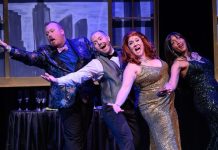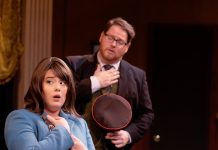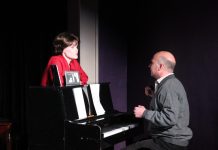I am so happy that several productions of Rooms: A Rock Romance are popping up all over the DC Metro area, and last night I attended Kensington Arts Theatre’s production of Paul Scott Goodman and Miriam Goodman’s Scottish Jewish musical and enjoyed the performances of its two leads – Eric Jones and Madeline Botteri. I asked them both to discuss their roles and their involvement in KAT’s production, In Part One, Eric Jones talks about playing the role of Ian Wallace.
Joel: How did you get involved with KAT’s production of Rooms: A Rock Romance?
Eric: Whenever I do a show, I look for ones that will challenge me, teach me, and allow me the opportunity to really grow as a performer. I also look for shows that seem like a lot of fun! I was just finishing up the run of Sunday in the Park with George at KAT when Dani first approached me about Rooms. She told me the basic premise and it sounded like a great show; I was honored that she invited me to audition. I decided to take a chance on something new, so I picked up my guitar for the first time in months and auditioned.
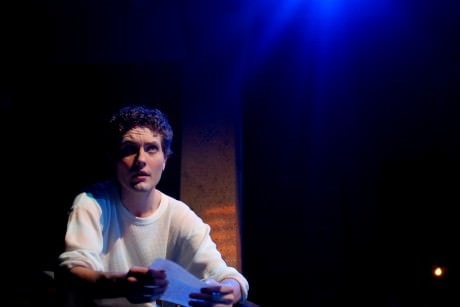
The auditions themselves were a great experience. Because we had a comparatively small number of people called back, Dani, Lenora, and Leah had the time to experiment and educe from us the qualities they sought. When I was offered the role, I felt a familiar mix of anxiety and elation – I knew I’d just been given the role of a lifetime.
Why did you want to play Ian, how do you relate to him, and why do you love playing him?
I like to consider myself a character actor, so I’m attracted to the idea of playing characters that are vastly different from each other. I’d been itching for a role into which I could really sink my teeth, so the prospect of playing an alcoholic Scottish punk rock star was very appealing! To prepare for the role I watched a lot of documentaries on alcoholism, researched punk music in the late ‘70’s, and practiced guitar day and night. Dani very graciously burnt CDs for everyone with music from the time that really put us in the mood of the show.
My first impression of Ian was a cursory one – he was a brooding, angsty rock star. During the callbacks however, Dani and Lenora encouraged me to have more fun and lighten him up (that eventually became a theme throughout rehearsals). I remember reading through the script shortly after having accepted the role and thinking “Okay, this all seems pretty straightforward, if not a little trite.” Much to the contrary, we discovered very early on that for two characters who have relatively little stage time, Monica and Ian have worlds of subtext and extremely wide ranges of emotions to experience. They could very easily be dismissed as archetypal characters in a familiar storyline (boy meets girl, boy loses girl, boy gets girl back, etc.), but they are two of the most complex, multi-dimensional characters I’ve ever encountered.
Silly though it may sound, I did not “create” the character of Ian. Over the last two months of rehearsals I’ve slowly gotten to know him as a person, and that’s how I’m choosing to play him – not as a character, but as a real person. I’ve spent many a long night discussing aspects of my personal life with the directors and the various ways in which this show hits close to home for me. Ian’s struggles very closely mirror issues that I’ve faced in my personal life, so taking this journey every night is a very surreal opportunity to face some of these things head-on. Of course he’s not all doom and gloom – Ian’s lighter moments are quite a lot of fun to play. He’s got an impish way about him and his offbeat sense of humor is really endearing to me. Plus, I love rocking out on guitar and punk-dancing like a loon!
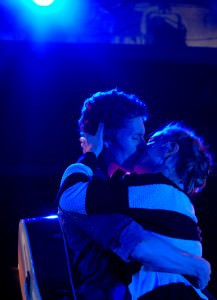
Ian goes through the highest highs and lowest lows of any character I’ve ever played (emotionally and vocally!) and to experience that arc leaves me emotionally dazed, yet satisfied. It’s a catharsis that I don’t yet fully understand. Through all his ups and downs, I find that what anchors Ian is his uncanny ability to maintain honesty while swimming in a world of artifice. I connect very deeply to his yearning for love and acceptance, and Ian learns the hard way that you have to accept yourself in order to be accepted by others. His passion, his wit, his temper, his charm, his anguish, his elation, his guilt, his innocence – they all combine to form a genuine, flawed, beautiful person in whose beat-up Converse Chucks it is a privilege to walk.
How would you describe Paul Scott Goodman’s score, and how hard was it to learn?
When I first got the recording of the show I listened to it once all the way through, trying to sing along with bits I recognized from the one music rehearsal we’d had at that point. From then on, I found myself listening to it again and again because I just really loved the music. Leah pointed out that for a relatively short show, there are many different styles of music included. The score goes from folk, to punk, to rock, to cruise-ship cheese (intentionally), to musical theatre – yet it all flows beautifully together and creates this show’s unique sound.
Once we really got into music rehearsals, I realized that this music is deceptively difficult. There are lots of little quirks that you don’t expect and they ensure that the show never becomes lugubrious. Every song is something different that challenges not only us as performers, but the audience as well. The way that the score moves the story forward at a comfortable pace while conveying these raw emotions is one of the reasons I fell in love with the music – it’s the perfect sound to tell this particular story.
Tell us about your ‘Big Numbers’ in the show.
Ian gets a lot of really powerful songs to sing. The script sets him up as this apathetic loner, but “Friday Night Dress” really lets the audience see into Ian’s heart for the first time. I feel like that song is where Ian first realizes his true feelings for Monica, but he can’t quite express them yet. Its simple genius is that instead of crooning a sappy, overly-dramatic outpouring of undying love, the only discourse Ian has to express these feelings is a simple “didn’t you look so pretty.”
“Fear of Flying” comes kicking right out of the box and is among the most difficult songs I’ve ever had to perform. It’s definitely a unique experience because in order to perform it properly, I can’t think. My brain goes on a sort of autopilot and I become a whirlwind of pure rage and adrenaline – it’s a rush like no other! Then comes the most important of Ian’s songs – “Clean.” The biggest challenge with this song for me was to effectively communicate to the audience that the song takes place at four separate AA meetings over the course of Ian’s 2.75-year recovery. This song took extensive work with Lenora and Dani to really capture all the little emotions racing through Ian’s heart. The first verse shows him covering up his major insecurities with cynical humor as usual, then the second verse is where he really starts to admit his mistakes and cry for help. The bridge is an incredible mixture of hope and fear as he marvels at how far he’s come but agonizes over how far he’s got left to go. The final verse then becomes a denouement – he’s grown up so much in the last few years, taken his lumps, and come out stronger on the other side. The song is a three-minute journey in and of itself, and I’m excited to see how its energy changes once the audience is there to experience it with me.
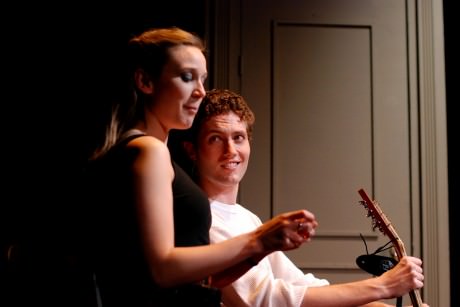
How did you learn your Scottish accent for the show?
I’ve always loved doing voices, impressions, and accents; I relish every opportunity to use one onstage. I’ve worked previously as a dialect coach for several shows (including one that called for at least ten different accents), but I’ll admit I needed help with this one. Scottish (especially the Glaswegian dialect that we do for Rooms) is an accent that doesn’t easily swing with American aural sensibilities. The vowel pronunciations can be so vastly different that many Americans claim not to be able to understand a native Scot’s English. I knew I had my work cut out for me, but I was excited for the challenge!
I started out by gathering my own research materials. The accent I use draws heavily from films like Trainspotting and Finding Neverland as well as legions of YouTube clips of Glaswegian comedian Billy Connolly and the music group The Proclaimers. Interestingly enough, The Proclaimers were asked early on in their careers to drop their natural Edinburgh brogues, but they refused – even going as far as to write a song dedicated to their accents (to which I’ve listened countless times)!
In addition to my own research, we were incredibly fortunate to have an outstanding dialect coach in Casey Jones. He is very well-versed and well-educated with dialects and has been an invaluable asset to the show. He helped Maddie and I master the tiny little details of the accent so that we can be understood by the audience; anybody familiar with Glaswegian accents will know that we’ve done our homework and made these accents as authentic as possible.
What’s it like working with Music Director Leah Kocsis?
I was very excited when I learned that Leah would be music directing this show (before I was even cast!). Having worked with her extensively during Violet at KAT, I know she pushes performers to the utmost of our capabilities to ensure the best possible performance. She understands every musical nuance of this score (which, as Maddie pointed out, is unusually intelligent for a rock score), and she has helped us not only to understand the music but also to develop our own unique way of performing it.
Leah has a very clear vision of what she wants from each piece, but she’s also allowed us the freedom to approach her with our own ideas so that we can explore and experiment until we find the right way to execute these songs. She’s definitely not shy about telling us when something doesn’t work, but that’s the mark of a great music director. When I would try something that wasn’t quite perfect, she didn’t just dismiss it – she explained precisely why it didn’t work and suggested several different ways to improve it. In doing so, she and I have worked in a sort of spiral – we go ‘round and ‘round until we hit the center of Ian’s target sound.
Perhaps one of the most profound quotes that I’ll take from the experience of this show is Leah saying that even though none of us are really in our “comfort zones” with this show, the challenge will make us better performers. I could not agree with her more. I’ve never played guitar in front of a paying audience before, so she really took the fear out of that for me. I also constantly struggle with pitch issues, but she approached the problem delicately so as not to make me self-conscious and worked with me until I got it right. Of all the things I’ve learned from this show, the training I’ve gotten from Leah will be what sticks with me the most – I am so grateful to have worked with her and I look forward to doing it again!
How did you develop the much needed chemistry with Madeline?
Anytime actors have to play lovers, there’s a bit of awkwardness immediately going in – knowing that you have to be very intimate with this person you’ve only just met. There was definitely that slight bit of ice between Maddie and me to start. Our schedules didn’t allow us to spend much time together outside of rehearsals, and we were both so focused on the show that we couldn’t talk much during rehearsals. To combat this, Dani had us do an exercise on the very first night in which we sat across from each other and repeated “I can be loved by you” and “I can be hurt by you” over and over again. I distinctly recall that being the first time that Maddie and I figured out how to communicate and develop our onstage chemistry.
Even though we didn’t talk much at first, we started developing non-verbal communication VERY quickly. Not only is Maddie an incredibly gifted performer, she’s also a very giving actress. From the very first night of rehearsal, tiny changes in her posture and facial expressions let me know how she was feeling and what she was thinking in every single moment. I started responding to her cues in a similar fashion and we began speaking volumes to each other without a single word. I’d never before experienced anything like it – something just clicked and the connection was there from the start! All we’ve really had to do over the last few weeks is continue to nurture that connection and let it grow.
There have only been a handful of times when I’ve had to be in love onstage and I always felt that it came off cheesy and awkward. Not so with Maddie – the level of trust that we’ve established over the last few weeks makes it really easy to fall in love with her night after night. When Ian and Monica have their big split-up and then spend the next fifteen minutes of stage time apart, we both go into our own worlds and sing these songs about being helpless without the other person. There was actually a moment very recently when, during a run, I got so emotionally involved in the show that when Maddie swung the door open and we see each other for the first time in awhile (2.75 years in the show, fifteen minutes in real time), I felt this overwhelming sense of longing. I had REALLY missed the synergy that we create when we share the stage, and I’d never felt anything like that before. That, to me, was a sign that the connection that Maddie and I have made has really blossomed into something unspeakably wonderful. All the other elements in the show have come together as well as they have simply because of the 100% complete trust that Maddie and I have built in each other. I could never have asked for a better costar, and I’m humbled and honored to take the stage with her every night.
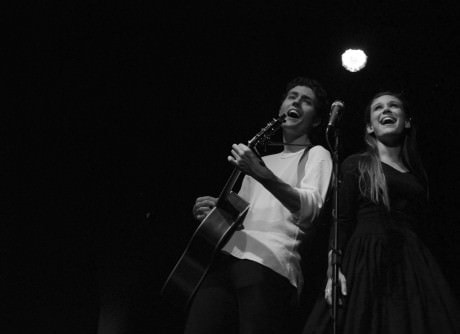
How did the directors Dani Danger Stoller and Lenora Spahn help with your performance?
This show is one of several that I’ve done in the past few years that have been so-called “dream projects” for the directors, and that is always a treat for me. I’m always excited to help people’s theatrical visions become reality, and that is exactly what happened with Rooms. It’s plain to see that Dani’s had an abiding passion for this show for a long time and she started by picking the right team of people to put this show together (a team in which I’m thrilled to be included!). From the outset, Dani’s enthusiasm and inspired vision for the show have been infectious; it’s made me all the more excited. Dani has such a clear concept for this show and for the most part we’ve remained faithful to her initial vision. She helped us to create connections, realize the moments, and fall in love with this material. Her unwavering élan really kept me on track whenever I felt unsure about this show – it’s a pleasure to work with a director who’s so passionate about both the material and the cast!
One of the greatest things about this particular production is that we had the luxury of a second director. Lenora has been a part of every show that I’ve ever done with KAT and I was so excited that she got the opportunity to take the reins for this show! She was an ideal counterpart for Dani. Dani provided the overall vision and big picture direction while Lenora fine-tuned the acting and translated Dani’s visions into practical reality. I did a lot of one-on-one work with Lenora for this show and I’ve just been blown away by her insight into these characters and the world of this show.
I remember talking to Lenora about my initial insecurities about playing Ian. I had thought of Ian as an extreme introvert and because I like to think of myself as an extrovert, Ian started out very sullen and dark. I talked about this with Lenora and because she knows me so well, she opened my eyes to the fact that I do have a substantial introverted side. She instructed me to let Ian be more of an extrovert because the introverted side I never knew I had would come through. Once I let go of my pre-conceived notions about the character and let her direction guide me, I instantaneously felt more natural and at ease within my own body. The difference between how we think we appear and how others perceive us is always uncanny, but Lenora’s wisdom in this matter really taught me to examine all sides of a character and that I don’t have to work so hard to allow those sides to be seen. Lenora really helped me connect with Ian in ways I hadn’t ever before connected to a character, and I could not be more grateful for that.
Both directors engendered an environment of trust that gave me the courage to open up about things I was experiencing in my personal life that could translate to the show. Anytime I was afraid, unsure, or hesitant, Dani and Lenora allowed me my space and encouraged me to find what was right for the character. They both were always there to provide constant encouragement when I needed it – they never allowed me to lose faith in myself, which means the world to me. I was almost unsure of what to do with all the attention I was able to receive during this show – such a luxury is extremely rare! Dani and Lenora took what I brought to the show, fine-tuned it, taught me more than I can say, and really helped me flourish. I am a better performer and a better person because of the lessons they taught me during this show. They have both become very dear to me, and I would leap at the chance to work with both of them again in any capacity.
Why should audiences come and see Rooms: A Rock Romance?
I’ve been performing for almost sixteen years, and I’ve had the pleasure of appearing in some truly wonderful shows. I’ve played a lot of challenging roles as well as many that were just plain fun however, no show or role has ever affected me quite as profoundly as Rooms has. This show has a power unequaled by anything I’ve ever done and we’ve all done our utmost to harness that power and make it our own. What the audience will be able to see in this more than in any other show I’ve done is the cohesion of the people involved. Every single person involved with the Rooms team is at the top of their game and we all work together as one to create this show.
I think what I like most about this show (and what audiences will definitely love) is that it’s an incredibly powerful show, but it doesn’t announce itself as such. It’s got something for everyone – a rather simple love story that would make a perfect date night, excellent music that really makes one feel these profound emotions (played to perfection by an AWESOME rock band), and the perfect balance of drama and comedy to satisfy those hungry for a truly great story. We at KAT have all been extremely moved by the power of this show, and we’ve made sure to handle this production with that feeling always in the backs of our minds. I am eagerly anticipating the heights to which this show will rise!
Rooms: A Rock Romance plays through May 26, 2012 at Kensington Arts Theatre – 3710 Mitchell Street in The Kensington Armory/City Hall, in Kensington, MD. For tickets, call the box office (206) 888-6643, or order them online.



